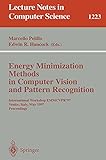Energy Minimization Methods in Computer Vision and Pattern Recognition [electronic resource] : International Workshop EMMCVPR'97 Venice, Italy, May 21–23, 1997 Proceedings / edited by Marcello Pelillo, Edwin R. Hancock.
Material type: TextSeries: Lecture Notes in Computer Science ; 1223Publisher: Berlin, Heidelberg : Springer Berlin Heidelberg, 1997Description: XII, 556 p. online resourceContent type: text Media type: computer Carrier type: online resourceISBN: 9783540690429Subject(s): Computer science | Computer software | Artificial intelligence | Computer graphics | Optical pattern recognition | Computer Science | Pattern Recognition | Artificial Intelligence (incl. Robotics) | Computer Graphics | Algorithm Analysis and Problem Complexity | Computation by Abstract DevicesAdditional physical formats: Printed edition:: No titleDDC classification: 006.4 LOC classification: Q337.5TK7882.P3Online resources: Click here to access online
TextSeries: Lecture Notes in Computer Science ; 1223Publisher: Berlin, Heidelberg : Springer Berlin Heidelberg, 1997Description: XII, 556 p. online resourceContent type: text Media type: computer Carrier type: online resourceISBN: 9783540690429Subject(s): Computer science | Computer software | Artificial intelligence | Computer graphics | Optical pattern recognition | Computer Science | Pattern Recognition | Artificial Intelligence (incl. Robotics) | Computer Graphics | Algorithm Analysis and Problem Complexity | Computation by Abstract DevicesAdditional physical formats: Printed edition:: No titleDDC classification: 006.4 LOC classification: Q337.5TK7882.P3Online resources: Click here to access online  E-BOOKS
E-BOOKS
| Current library | Home library | Call number | Materials specified | URL | Status | Date due | Barcode |
|---|---|---|---|---|---|---|---|
| IMSc Library | IMSc Library | Link to resource | Available | EBK7101 |
Reliable computation and related games -- Characterizing the distribution of completion shapes with corners using a mixture of random processes -- Adaptive parametrically deformable contours -- Kona: A multi-junction detector using minimum description length principle -- Restoration of SAR images using recovery of discontinuities and non-linear optimization -- Geometrically deformable templates for shape-based segmentation and tracking in cardiac MR images -- Image segmentation via energy minimization on partitions with connected components -- Restoration of severely blurred high range images using stochastic and deterministic relaxation algorithms in compound gauss Markov random fields -- Maximum likelihood estimation of Markov Random Field parameters using Markov Chain Monte Carlo algorithms -- Noniterative manipulation of discrete energy-based models for image analysis -- Unsupervised image segmentation using Markov Random Field models -- Adaptive anisotropic parameter estimation in the weak membrane model -- Twenty questions, focus of attention, and A*: A theoretical comparison of optimization strategies -- Deterministic annealing for unsupervised texture segmentation -- Self annealing: Unifying deterministic annealing and relaxation labeling -- Multidimensional scaling by deterministic annealing -- Deterministic search strategies for relational graph matching -- Object localization using color, texture and shape -- Visual deconstruction: Recognizing articulated objects -- Optimization problems in statistical object recognition -- Object recognition using stochastic optimization -- Genetic algorithms for ambiguous labelling problems -- Toward global solution to MAP image estimation: Using Common structure of local solutions -- Figure-ground separation: A case study in energy minimization via evolutionary computing -- Probabilistic relaxation: Potential, relationships and open problems -- A region-level motion-based graph representation and labeling for tracking a spatial image partition -- An expectation-maximisation approach to graph matching -- An energy minimization method for matching and comparing structured object representations -- Consistent modeling of terrain and drainage using deformable models -- Integration of confidence information by Markov Random Fields for reconstruction of underwater 3D acoustic images -- Unsupervised segmentation applied on sonar images -- SAR image registration and segmentation using an estimated DEM -- Deformable templates for tracking and analysis of intravascular ultrasound sequences -- Motion correspondence through energy minimization.
This book constitutes the refereed proceedings of the International Workshop on Energy Minimization Methods in Computer Vision and Pattern Recognition, EMMCVPR'97, held in Venice, Italy, in May 1997. The book presents 29 revised full papers selected from a total of 62 submissions. Also included are four full invited papers and a keynote paper by leading researchers. The volume is organized in sections on contours and deformable models, Markov random fields, deterministic methods, object recognition, evolutionary search, structural models, and applications. The volume is the first comprehensive documentation of the application of energy minimization techniques in the areas of compiler vision and pattern recognition.


There are no comments on this title.